Analysis of Leadership and Operational Management at TESCO: A Report
VerifiedAdded on 2020/06/06
|15
|4967
|96
Report
AI Summary
This report delves into the leadership and operational management practices of TESCO, a multinational retail giant. It defines the roles and characteristics of leaders and managers, highlighting their distinct responsibilities and contributions within the organization. The report examines the application of leadership and managerial functions in various situations, such as conflict resolution, decision-making, and employee development. It also explores different leadership theories, including contingency and situational theories, system leadership theory, and behavioral approaches, providing insights into how these theories are applied in practice. Furthermore, the report analyzes key approaches to operational management, emphasizing their importance and value in achieving organizational goals. Finally, it discusses the impact of internal factors on operational management and decision-making processes within TESCO.
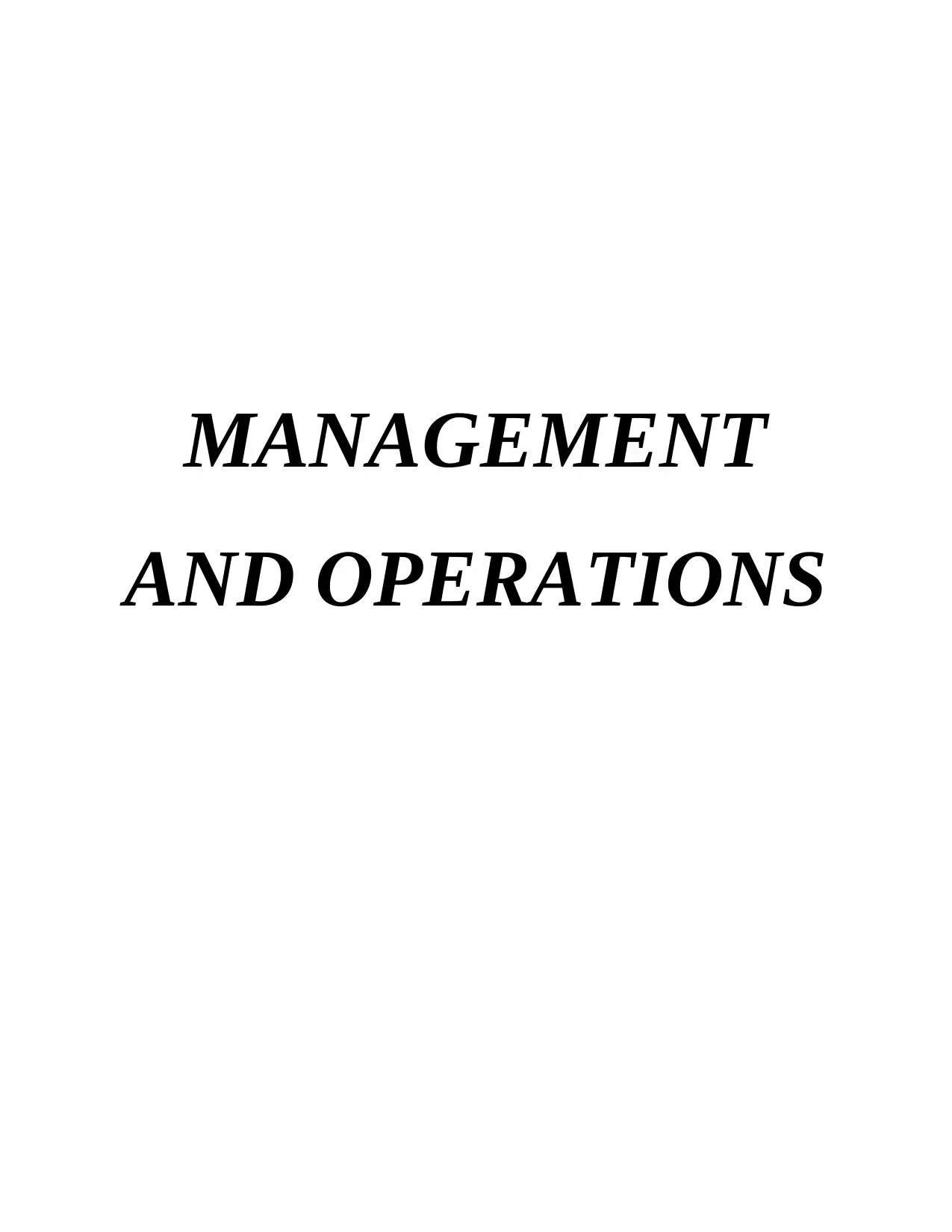
MANAGEMENT
AND OPERATIONS
AND OPERATIONS
Paraphrase This Document
Need a fresh take? Get an instant paraphrase of this document with our AI Paraphraser
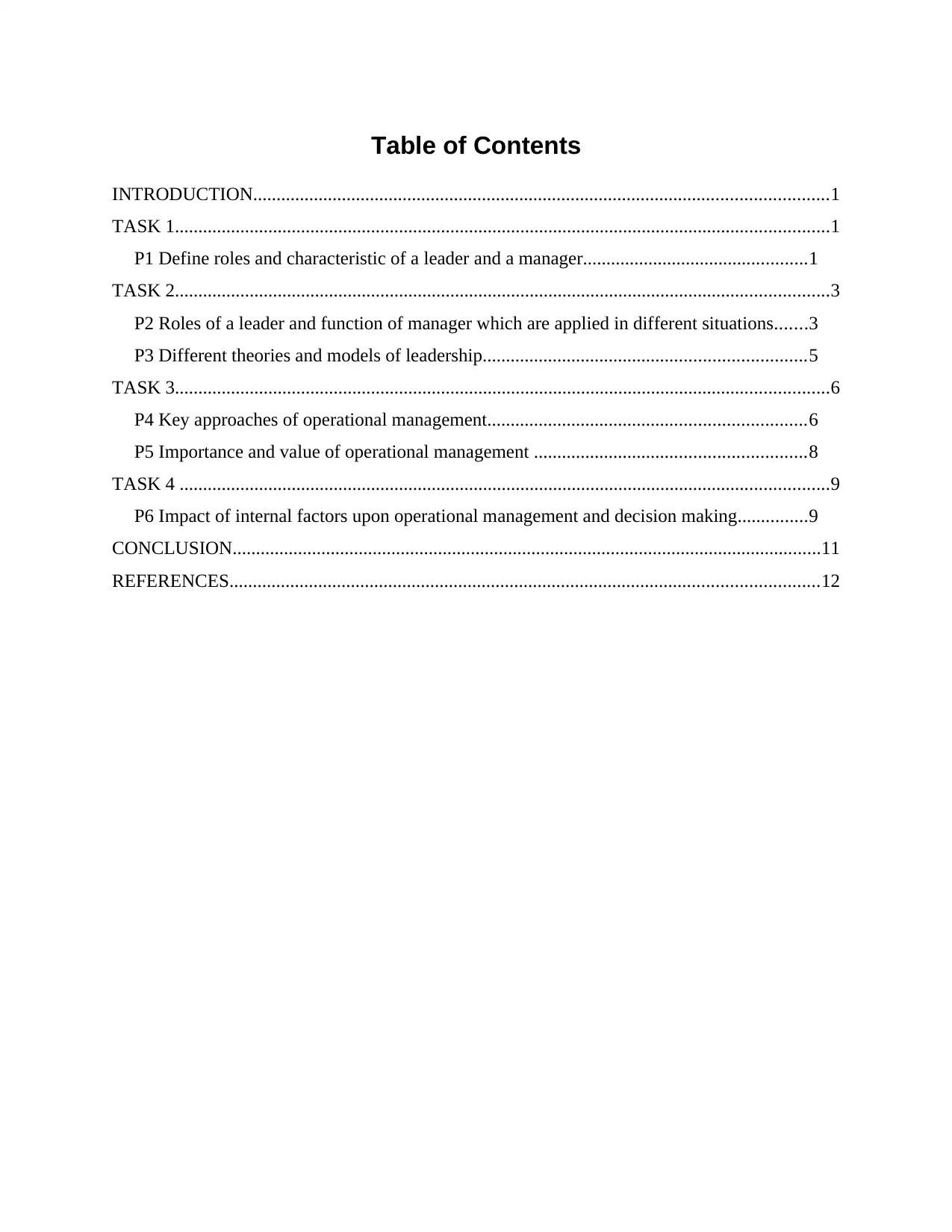
Table of Contents
INTRODUCTION...........................................................................................................................1
TASK 1............................................................................................................................................1
P1 Define roles and characteristic of a leader and a manager................................................1
TASK 2............................................................................................................................................3
P2 Roles of a leader and function of manager which are applied in different situations.......3
P3 Different theories and models of leadership.....................................................................5
TASK 3............................................................................................................................................6
P4 Key approaches of operational management....................................................................6
P5 Importance and value of operational management ..........................................................8
TASK 4 ...........................................................................................................................................9
P6 Impact of internal factors upon operational management and decision making...............9
CONCLUSION..............................................................................................................................11
REFERENCES..............................................................................................................................12
INTRODUCTION...........................................................................................................................1
TASK 1............................................................................................................................................1
P1 Define roles and characteristic of a leader and a manager................................................1
TASK 2............................................................................................................................................3
P2 Roles of a leader and function of manager which are applied in different situations.......3
P3 Different theories and models of leadership.....................................................................5
TASK 3............................................................................................................................................6
P4 Key approaches of operational management....................................................................6
P5 Importance and value of operational management ..........................................................8
TASK 4 ...........................................................................................................................................9
P6 Impact of internal factors upon operational management and decision making...............9
CONCLUSION..............................................................................................................................11
REFERENCES..............................................................................................................................12
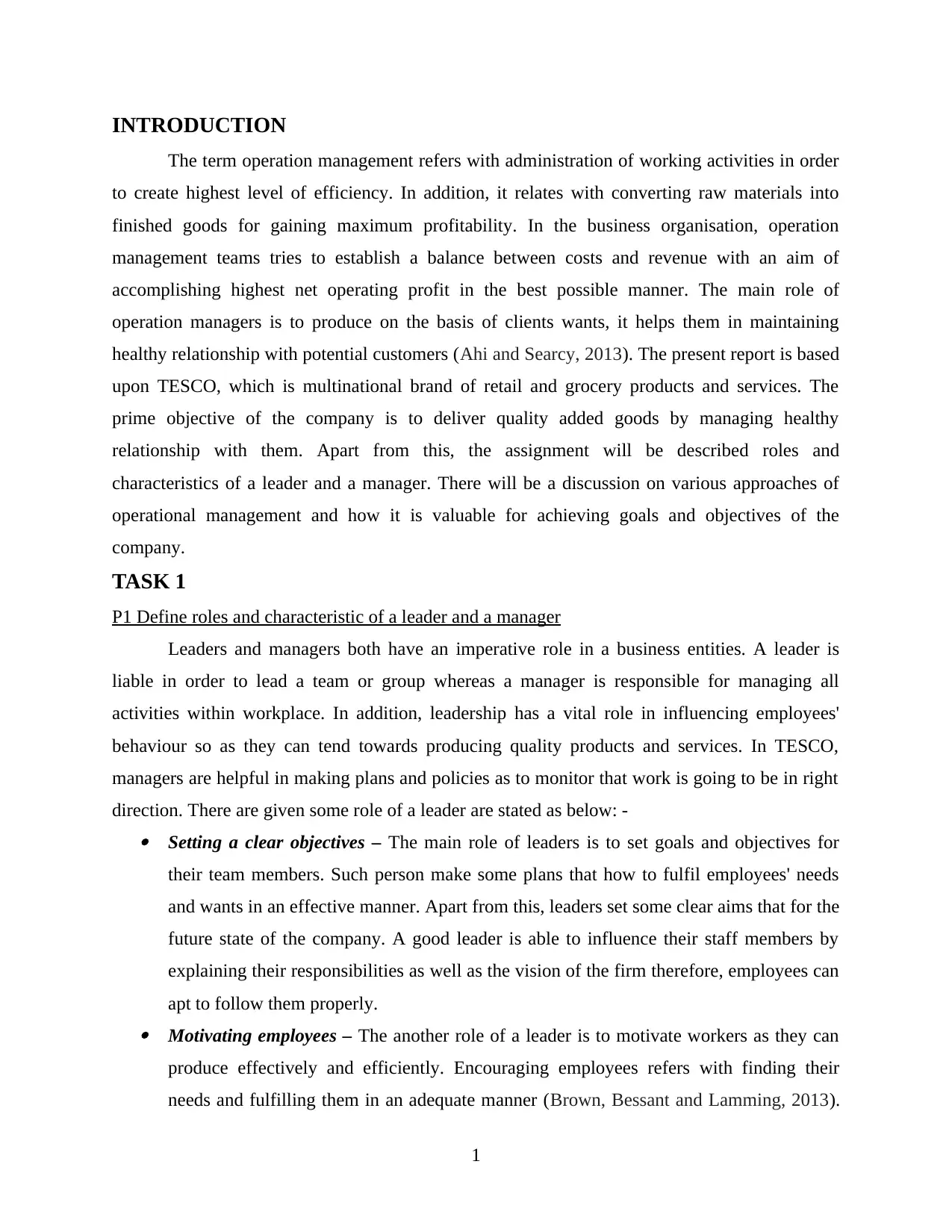
INTRODUCTION
The term operation management refers with administration of working activities in order
to create highest level of efficiency. In addition, it relates with converting raw materials into
finished goods for gaining maximum profitability. In the business organisation, operation
management teams tries to establish a balance between costs and revenue with an aim of
accomplishing highest net operating profit in the best possible manner. The main role of
operation managers is to produce on the basis of clients wants, it helps them in maintaining
healthy relationship with potential customers (Ahi and Searcy, 2013). The present report is based
upon TESCO, which is multinational brand of retail and grocery products and services. The
prime objective of the company is to deliver quality added goods by managing healthy
relationship with them. Apart from this, the assignment will be described roles and
characteristics of a leader and a manager. There will be a discussion on various approaches of
operational management and how it is valuable for achieving goals and objectives of the
company.
TASK 1
P1 Define roles and characteristic of a leader and a manager
Leaders and managers both have an imperative role in a business entities. A leader is
liable in order to lead a team or group whereas a manager is responsible for managing all
activities within workplace. In addition, leadership has a vital role in influencing employees'
behaviour so as they can tend towards producing quality products and services. In TESCO,
managers are helpful in making plans and policies as to monitor that work is going to be in right
direction. There are given some role of a leader are stated as below: - Setting a clear objectives – The main role of leaders is to set goals and objectives for
their team members. Such person make some plans that how to fulfil employees' needs
and wants in an effective manner. Apart from this, leaders set some clear aims that for the
future state of the company. A good leader is able to influence their staff members by
explaining their responsibilities as well as the vision of the firm therefore, employees can
apt to follow them properly. Motivating employees – The another role of a leader is to motivate workers as they can
produce effectively and efficiently. Encouraging employees refers with finding their
needs and fulfilling them in an adequate manner (Brown, Bessant and Lamming, 2013).
1
The term operation management refers with administration of working activities in order
to create highest level of efficiency. In addition, it relates with converting raw materials into
finished goods for gaining maximum profitability. In the business organisation, operation
management teams tries to establish a balance between costs and revenue with an aim of
accomplishing highest net operating profit in the best possible manner. The main role of
operation managers is to produce on the basis of clients wants, it helps them in maintaining
healthy relationship with potential customers (Ahi and Searcy, 2013). The present report is based
upon TESCO, which is multinational brand of retail and grocery products and services. The
prime objective of the company is to deliver quality added goods by managing healthy
relationship with them. Apart from this, the assignment will be described roles and
characteristics of a leader and a manager. There will be a discussion on various approaches of
operational management and how it is valuable for achieving goals and objectives of the
company.
TASK 1
P1 Define roles and characteristic of a leader and a manager
Leaders and managers both have an imperative role in a business entities. A leader is
liable in order to lead a team or group whereas a manager is responsible for managing all
activities within workplace. In addition, leadership has a vital role in influencing employees'
behaviour so as they can tend towards producing quality products and services. In TESCO,
managers are helpful in making plans and policies as to monitor that work is going to be in right
direction. There are given some role of a leader are stated as below: - Setting a clear objectives – The main role of leaders is to set goals and objectives for
their team members. Such person make some plans that how to fulfil employees' needs
and wants in an effective manner. Apart from this, leaders set some clear aims that for the
future state of the company. A good leader is able to influence their staff members by
explaining their responsibilities as well as the vision of the firm therefore, employees can
apt to follow them properly. Motivating employees – The another role of a leader is to motivate workers as they can
produce effectively and efficiently. Encouraging employees refers with finding their
needs and fulfilling them in an adequate manner (Brown, Bessant and Lamming, 2013).
1
⊘ This is a preview!⊘
Do you want full access?
Subscribe today to unlock all pages.

Trusted by 1+ million students worldwide
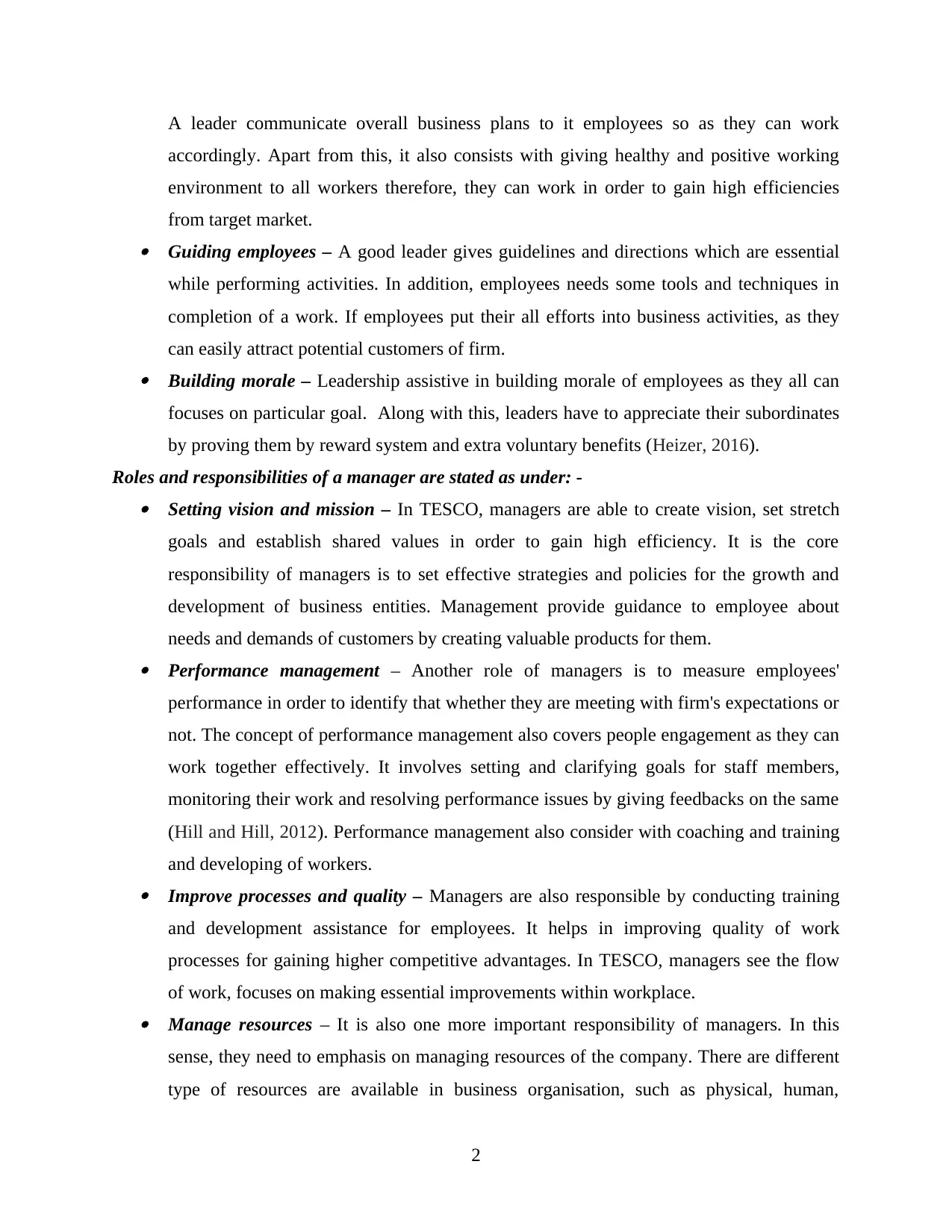
A leader communicate overall business plans to it employees so as they can work
accordingly. Apart from this, it also consists with giving healthy and positive working
environment to all workers therefore, they can work in order to gain high efficiencies
from target market. Guiding employees – A good leader gives guidelines and directions which are essential
while performing activities. In addition, employees needs some tools and techniques in
completion of a work. If employees put their all efforts into business activities, as they
can easily attract potential customers of firm. Building morale – Leadership assistive in building morale of employees as they all can
focuses on particular goal. Along with this, leaders have to appreciate their subordinates
by proving them by reward system and extra voluntary benefits (Heizer, 2016).
Roles and responsibilities of a manager are stated as under: - Setting vision and mission – In TESCO, managers are able to create vision, set stretch
goals and establish shared values in order to gain high efficiency. It is the core
responsibility of managers is to set effective strategies and policies for the growth and
development of business entities. Management provide guidance to employee about
needs and demands of customers by creating valuable products for them. Performance management – Another role of managers is to measure employees'
performance in order to identify that whether they are meeting with firm's expectations or
not. The concept of performance management also covers people engagement as they can
work together effectively. It involves setting and clarifying goals for staff members,
monitoring their work and resolving performance issues by giving feedbacks on the same
(Hill and Hill, 2012). Performance management also consider with coaching and training
and developing of workers. Improve processes and quality – Managers are also responsible by conducting training
and development assistance for employees. It helps in improving quality of work
processes for gaining higher competitive advantages. In TESCO, managers see the flow
of work, focuses on making essential improvements within workplace. Manage resources – It is also one more important responsibility of managers. In this
sense, they need to emphasis on managing resources of the company. There are different
type of resources are available in business organisation, such as physical, human,
2
accordingly. Apart from this, it also consists with giving healthy and positive working
environment to all workers therefore, they can work in order to gain high efficiencies
from target market. Guiding employees – A good leader gives guidelines and directions which are essential
while performing activities. In addition, employees needs some tools and techniques in
completion of a work. If employees put their all efforts into business activities, as they
can easily attract potential customers of firm. Building morale – Leadership assistive in building morale of employees as they all can
focuses on particular goal. Along with this, leaders have to appreciate their subordinates
by proving them by reward system and extra voluntary benefits (Heizer, 2016).
Roles and responsibilities of a manager are stated as under: - Setting vision and mission – In TESCO, managers are able to create vision, set stretch
goals and establish shared values in order to gain high efficiency. It is the core
responsibility of managers is to set effective strategies and policies for the growth and
development of business entities. Management provide guidance to employee about
needs and demands of customers by creating valuable products for them. Performance management – Another role of managers is to measure employees'
performance in order to identify that whether they are meeting with firm's expectations or
not. The concept of performance management also covers people engagement as they can
work together effectively. It involves setting and clarifying goals for staff members,
monitoring their work and resolving performance issues by giving feedbacks on the same
(Hill and Hill, 2012). Performance management also consider with coaching and training
and developing of workers. Improve processes and quality – Managers are also responsible by conducting training
and development assistance for employees. It helps in improving quality of work
processes for gaining higher competitive advantages. In TESCO, managers see the flow
of work, focuses on making essential improvements within workplace. Manage resources – It is also one more important responsibility of managers. In this
sense, they need to emphasis on managing resources of the company. There are different
type of resources are available in business organisation, such as physical, human,
2
Paraphrase This Document
Need a fresh take? Get an instant paraphrase of this document with our AI Paraphraser
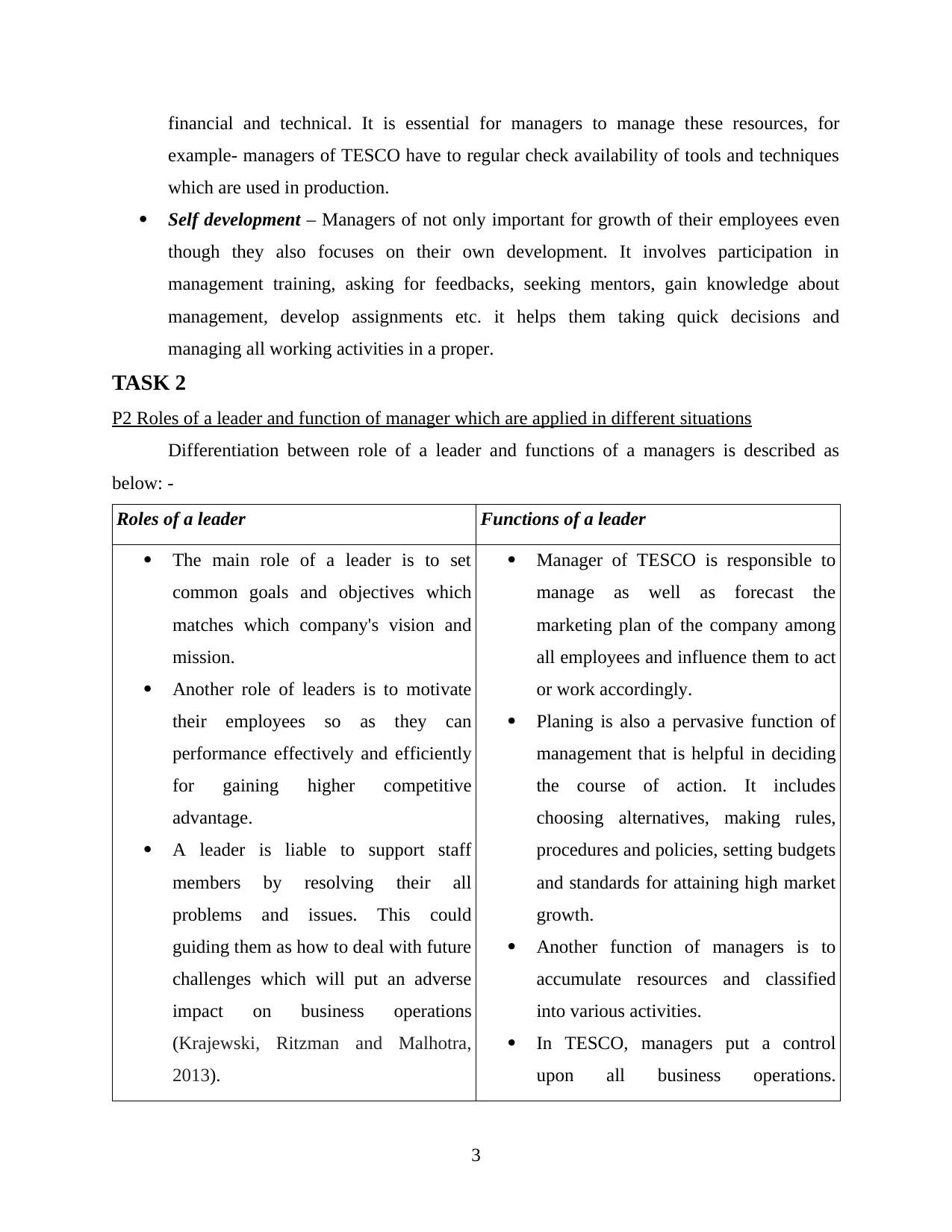
financial and technical. It is essential for managers to manage these resources, for
example- managers of TESCO have to regular check availability of tools and techniques
which are used in production.
Self development – Managers of not only important for growth of their employees even
though they also focuses on their own development. It involves participation in
management training, asking for feedbacks, seeking mentors, gain knowledge about
management, develop assignments etc. it helps them taking quick decisions and
managing all working activities in a proper.
TASK 2
P2 Roles of a leader and function of manager which are applied in different situations
Differentiation between role of a leader and functions of a managers is described as
below: -
Roles of a leader Functions of a leader
The main role of a leader is to set
common goals and objectives which
matches which company's vision and
mission.
Another role of leaders is to motivate
their employees so as they can
performance effectively and efficiently
for gaining higher competitive
advantage.
A leader is liable to support staff
members by resolving their all
problems and issues. This could
guiding them as how to deal with future
challenges which will put an adverse
impact on business operations
(Krajewski, Ritzman and Malhotra,
2013).
Manager of TESCO is responsible to
manage as well as forecast the
marketing plan of the company among
all employees and influence them to act
or work accordingly.
Planing is also a pervasive function of
management that is helpful in deciding
the course of action. It includes
choosing alternatives, making rules,
procedures and policies, setting budgets
and standards for attaining high market
growth.
Another function of managers is to
accumulate resources and classified
into various activities.
In TESCO, managers put a control
upon all business operations.
3
example- managers of TESCO have to regular check availability of tools and techniques
which are used in production.
Self development – Managers of not only important for growth of their employees even
though they also focuses on their own development. It involves participation in
management training, asking for feedbacks, seeking mentors, gain knowledge about
management, develop assignments etc. it helps them taking quick decisions and
managing all working activities in a proper.
TASK 2
P2 Roles of a leader and function of manager which are applied in different situations
Differentiation between role of a leader and functions of a managers is described as
below: -
Roles of a leader Functions of a leader
The main role of a leader is to set
common goals and objectives which
matches which company's vision and
mission.
Another role of leaders is to motivate
their employees so as they can
performance effectively and efficiently
for gaining higher competitive
advantage.
A leader is liable to support staff
members by resolving their all
problems and issues. This could
guiding them as how to deal with future
challenges which will put an adverse
impact on business operations
(Krajewski, Ritzman and Malhotra,
2013).
Manager of TESCO is responsible to
manage as well as forecast the
marketing plan of the company among
all employees and influence them to act
or work accordingly.
Planing is also a pervasive function of
management that is helpful in deciding
the course of action. It includes
choosing alternatives, making rules,
procedures and policies, setting budgets
and standards for attaining high market
growth.
Another function of managers is to
accumulate resources and classified
into various activities.
In TESCO, managers put a control
upon all business operations.
3
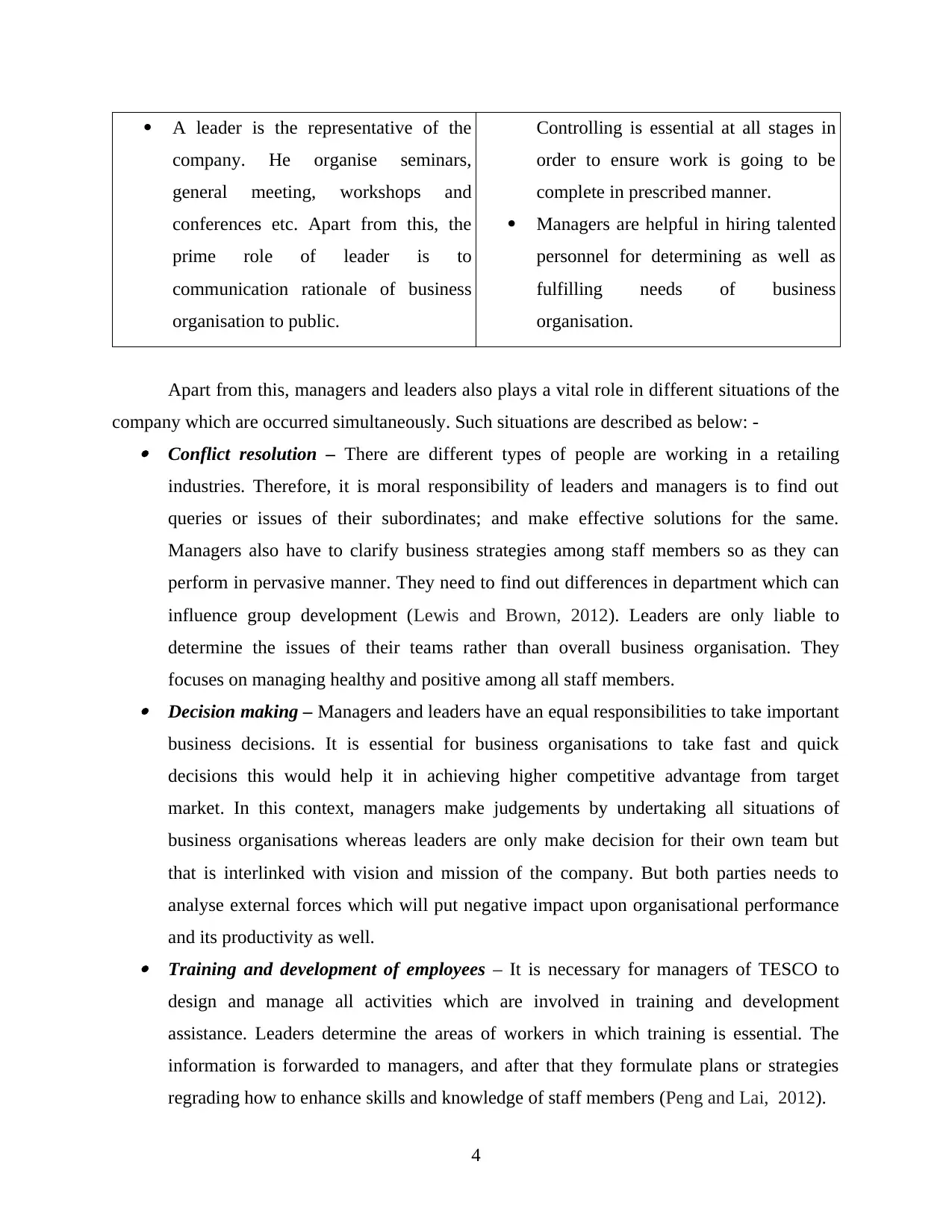
A leader is the representative of the
company. He organise seminars,
general meeting, workshops and
conferences etc. Apart from this, the
prime role of leader is to
communication rationale of business
organisation to public.
Controlling is essential at all stages in
order to ensure work is going to be
complete in prescribed manner.
Managers are helpful in hiring talented
personnel for determining as well as
fulfilling needs of business
organisation.
Apart from this, managers and leaders also plays a vital role in different situations of the
company which are occurred simultaneously. Such situations are described as below: - Conflict resolution – There are different types of people are working in a retailing
industries. Therefore, it is moral responsibility of leaders and managers is to find out
queries or issues of their subordinates; and make effective solutions for the same.
Managers also have to clarify business strategies among staff members so as they can
perform in pervasive manner. They need to find out differences in department which can
influence group development (Lewis and Brown, 2012). Leaders are only liable to
determine the issues of their teams rather than overall business organisation. They
focuses on managing healthy and positive among all staff members. Decision making – Managers and leaders have an equal responsibilities to take important
business decisions. It is essential for business organisations to take fast and quick
decisions this would help it in achieving higher competitive advantage from target
market. In this context, managers make judgements by undertaking all situations of
business organisations whereas leaders are only make decision for their own team but
that is interlinked with vision and mission of the company. But both parties needs to
analyse external forces which will put negative impact upon organisational performance
and its productivity as well. Training and development of employees – It is necessary for managers of TESCO to
design and manage all activities which are involved in training and development
assistance. Leaders determine the areas of workers in which training is essential. The
information is forwarded to managers, and after that they formulate plans or strategies
regrading how to enhance skills and knowledge of staff members (Peng and Lai, 2012).
4
company. He organise seminars,
general meeting, workshops and
conferences etc. Apart from this, the
prime role of leader is to
communication rationale of business
organisation to public.
Controlling is essential at all stages in
order to ensure work is going to be
complete in prescribed manner.
Managers are helpful in hiring talented
personnel for determining as well as
fulfilling needs of business
organisation.
Apart from this, managers and leaders also plays a vital role in different situations of the
company which are occurred simultaneously. Such situations are described as below: - Conflict resolution – There are different types of people are working in a retailing
industries. Therefore, it is moral responsibility of leaders and managers is to find out
queries or issues of their subordinates; and make effective solutions for the same.
Managers also have to clarify business strategies among staff members so as they can
perform in pervasive manner. They need to find out differences in department which can
influence group development (Lewis and Brown, 2012). Leaders are only liable to
determine the issues of their teams rather than overall business organisation. They
focuses on managing healthy and positive among all staff members. Decision making – Managers and leaders have an equal responsibilities to take important
business decisions. It is essential for business organisations to take fast and quick
decisions this would help it in achieving higher competitive advantage from target
market. In this context, managers make judgements by undertaking all situations of
business organisations whereas leaders are only make decision for their own team but
that is interlinked with vision and mission of the company. But both parties needs to
analyse external forces which will put negative impact upon organisational performance
and its productivity as well. Training and development of employees – It is necessary for managers of TESCO to
design and manage all activities which are involved in training and development
assistance. Leaders determine the areas of workers in which training is essential. The
information is forwarded to managers, and after that they formulate plans or strategies
regrading how to enhance skills and knowledge of staff members (Peng and Lai, 2012).
4
⊘ This is a preview!⊘
Do you want full access?
Subscribe today to unlock all pages.

Trusted by 1+ million students worldwide
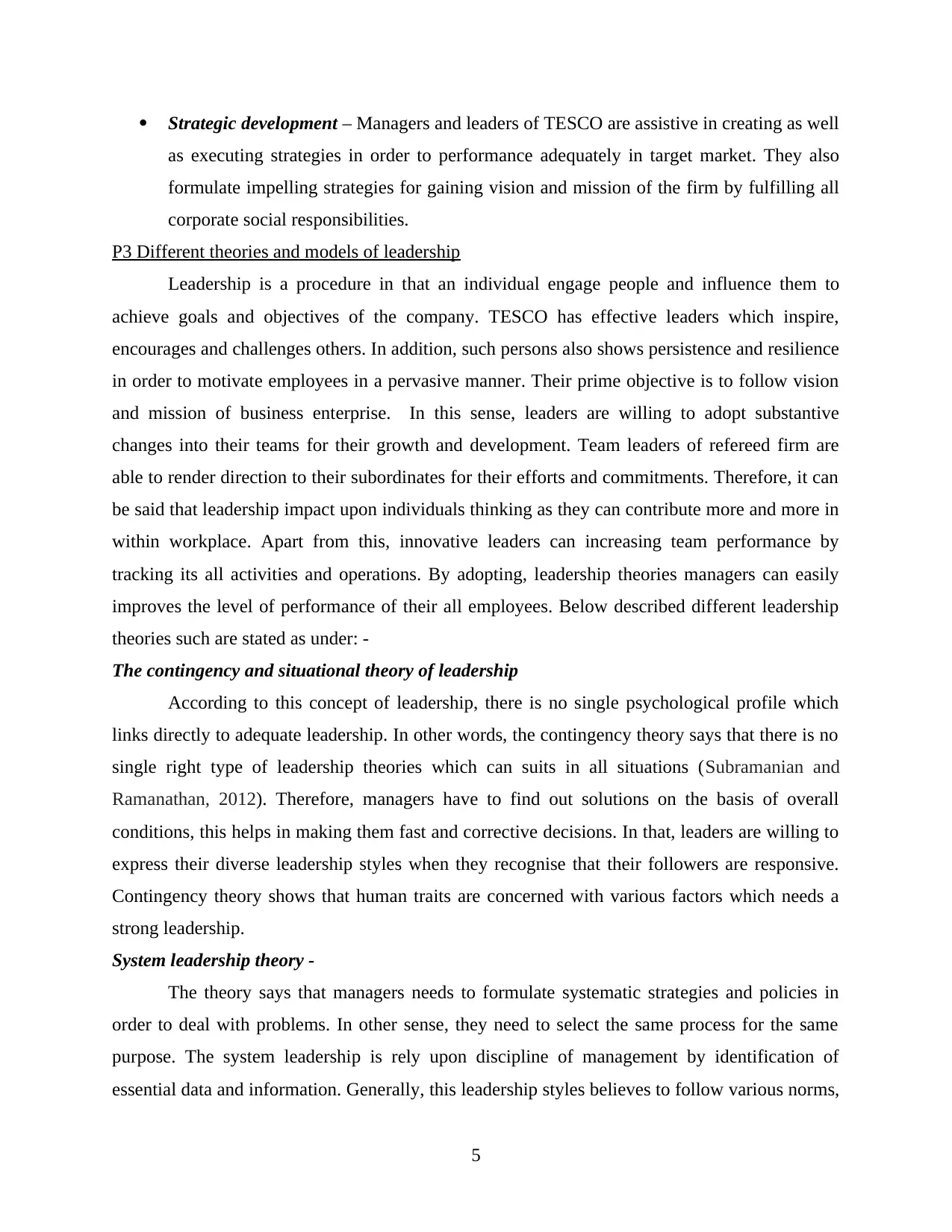
Strategic development – Managers and leaders of TESCO are assistive in creating as well
as executing strategies in order to performance adequately in target market. They also
formulate impelling strategies for gaining vision and mission of the firm by fulfilling all
corporate social responsibilities.
P3 Different theories and models of leadership
Leadership is a procedure in that an individual engage people and influence them to
achieve goals and objectives of the company. TESCO has effective leaders which inspire,
encourages and challenges others. In addition, such persons also shows persistence and resilience
in order to motivate employees in a pervasive manner. Their prime objective is to follow vision
and mission of business enterprise. In this sense, leaders are willing to adopt substantive
changes into their teams for their growth and development. Team leaders of refereed firm are
able to render direction to their subordinates for their efforts and commitments. Therefore, it can
be said that leadership impact upon individuals thinking as they can contribute more and more in
within workplace. Apart from this, innovative leaders can increasing team performance by
tracking its all activities and operations. By adopting, leadership theories managers can easily
improves the level of performance of their all employees. Below described different leadership
theories such are stated as under: -
The contingency and situational theory of leadership
According to this concept of leadership, there is no single psychological profile which
links directly to adequate leadership. In other words, the contingency theory says that there is no
single right type of leadership theories which can suits in all situations (Subramanian and
Ramanathan, 2012). Therefore, managers have to find out solutions on the basis of overall
conditions, this helps in making them fast and corrective decisions. In that, leaders are willing to
express their diverse leadership styles when they recognise that their followers are responsive.
Contingency theory shows that human traits are concerned with various factors which needs a
strong leadership.
System leadership theory -
The theory says that managers needs to formulate systematic strategies and policies in
order to deal with problems. In other sense, they need to select the same process for the same
purpose. The system leadership is rely upon discipline of management by identification of
essential data and information. Generally, this leadership styles believes to follow various norms,
5
as executing strategies in order to performance adequately in target market. They also
formulate impelling strategies for gaining vision and mission of the firm by fulfilling all
corporate social responsibilities.
P3 Different theories and models of leadership
Leadership is a procedure in that an individual engage people and influence them to
achieve goals and objectives of the company. TESCO has effective leaders which inspire,
encourages and challenges others. In addition, such persons also shows persistence and resilience
in order to motivate employees in a pervasive manner. Their prime objective is to follow vision
and mission of business enterprise. In this sense, leaders are willing to adopt substantive
changes into their teams for their growth and development. Team leaders of refereed firm are
able to render direction to their subordinates for their efforts and commitments. Therefore, it can
be said that leadership impact upon individuals thinking as they can contribute more and more in
within workplace. Apart from this, innovative leaders can increasing team performance by
tracking its all activities and operations. By adopting, leadership theories managers can easily
improves the level of performance of their all employees. Below described different leadership
theories such are stated as under: -
The contingency and situational theory of leadership
According to this concept of leadership, there is no single psychological profile which
links directly to adequate leadership. In other words, the contingency theory says that there is no
single right type of leadership theories which can suits in all situations (Subramanian and
Ramanathan, 2012). Therefore, managers have to find out solutions on the basis of overall
conditions, this helps in making them fast and corrective decisions. In that, leaders are willing to
express their diverse leadership styles when they recognise that their followers are responsive.
Contingency theory shows that human traits are concerned with various factors which needs a
strong leadership.
System leadership theory -
The theory says that managers needs to formulate systematic strategies and policies in
order to deal with problems. In other sense, they need to select the same process for the same
purpose. The system leadership is rely upon discipline of management by identification of
essential data and information. Generally, this leadership styles believes to follow various norms,
5
Paraphrase This Document
Need a fresh take? Get an instant paraphrase of this document with our AI Paraphraser
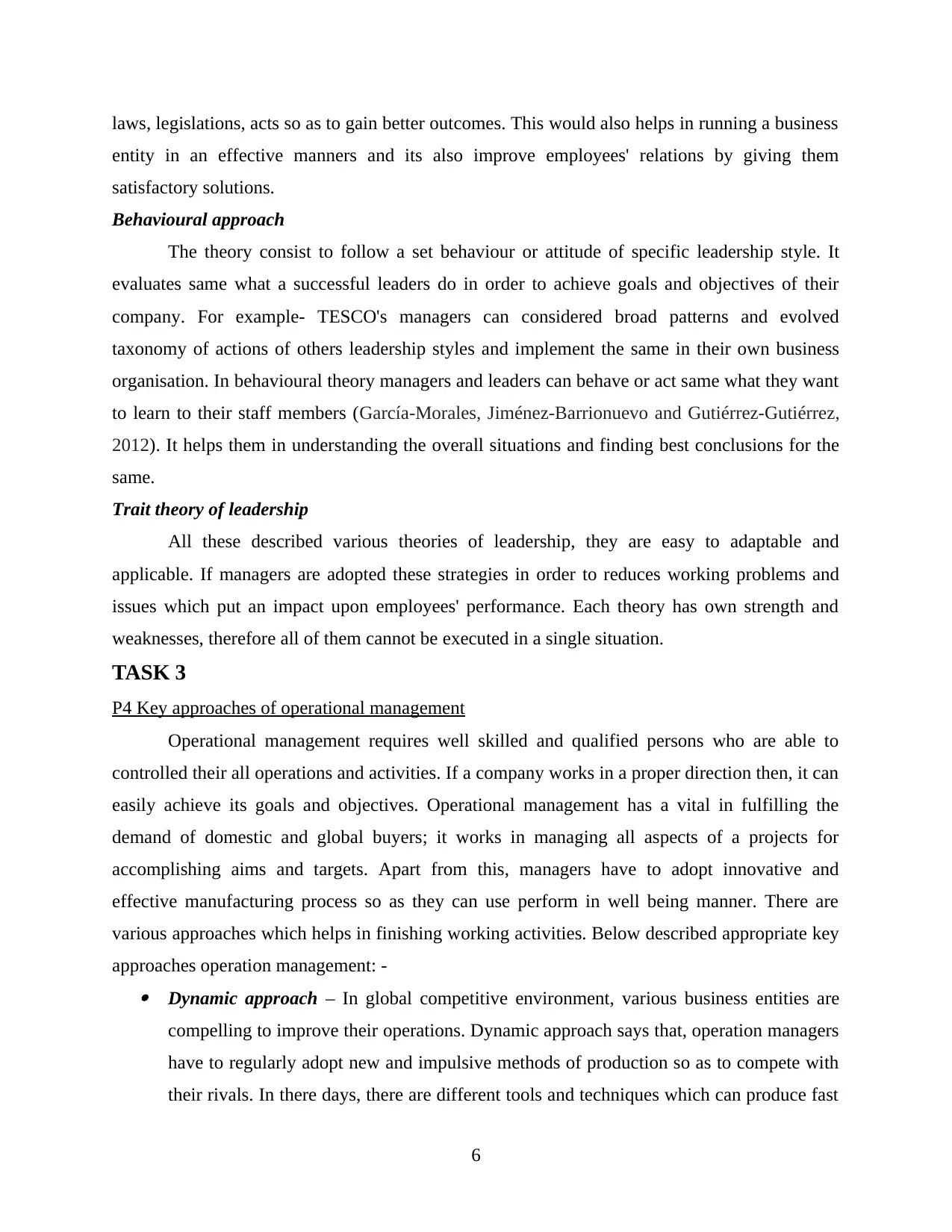
laws, legislations, acts so as to gain better outcomes. This would also helps in running a business
entity in an effective manners and its also improve employees' relations by giving them
satisfactory solutions.
Behavioural approach
The theory consist to follow a set behaviour or attitude of specific leadership style. It
evaluates same what a successful leaders do in order to achieve goals and objectives of their
company. For example- TESCO's managers can considered broad patterns and evolved
taxonomy of actions of others leadership styles and implement the same in their own business
organisation. In behavioural theory managers and leaders can behave or act same what they want
to learn to their staff members (García-Morales, Jiménez-Barrionuevo and Gutiérrez-Gutiérrez,
2012). It helps them in understanding the overall situations and finding best conclusions for the
same.
Trait theory of leadership
All these described various theories of leadership, they are easy to adaptable and
applicable. If managers are adopted these strategies in order to reduces working problems and
issues which put an impact upon employees' performance. Each theory has own strength and
weaknesses, therefore all of them cannot be executed in a single situation.
TASK 3
P4 Key approaches of operational management
Operational management requires well skilled and qualified persons who are able to
controlled their all operations and activities. If a company works in a proper direction then, it can
easily achieve its goals and objectives. Operational management has a vital in fulfilling the
demand of domestic and global buyers; it works in managing all aspects of a projects for
accomplishing aims and targets. Apart from this, managers have to adopt innovative and
effective manufacturing process so as they can use perform in well being manner. There are
various approaches which helps in finishing working activities. Below described appropriate key
approaches operation management: - Dynamic approach – In global competitive environment, various business entities are
compelling to improve their operations. Dynamic approach says that, operation managers
have to regularly adopt new and impulsive methods of production so as to compete with
their rivals. In there days, there are different tools and techniques which can produce fast
6
entity in an effective manners and its also improve employees' relations by giving them
satisfactory solutions.
Behavioural approach
The theory consist to follow a set behaviour or attitude of specific leadership style. It
evaluates same what a successful leaders do in order to achieve goals and objectives of their
company. For example- TESCO's managers can considered broad patterns and evolved
taxonomy of actions of others leadership styles and implement the same in their own business
organisation. In behavioural theory managers and leaders can behave or act same what they want
to learn to their staff members (García-Morales, Jiménez-Barrionuevo and Gutiérrez-Gutiérrez,
2012). It helps them in understanding the overall situations and finding best conclusions for the
same.
Trait theory of leadership
All these described various theories of leadership, they are easy to adaptable and
applicable. If managers are adopted these strategies in order to reduces working problems and
issues which put an impact upon employees' performance. Each theory has own strength and
weaknesses, therefore all of them cannot be executed in a single situation.
TASK 3
P4 Key approaches of operational management
Operational management requires well skilled and qualified persons who are able to
controlled their all operations and activities. If a company works in a proper direction then, it can
easily achieve its goals and objectives. Operational management has a vital in fulfilling the
demand of domestic and global buyers; it works in managing all aspects of a projects for
accomplishing aims and targets. Apart from this, managers have to adopt innovative and
effective manufacturing process so as they can use perform in well being manner. There are
various approaches which helps in finishing working activities. Below described appropriate key
approaches operation management: - Dynamic approach – In global competitive environment, various business entities are
compelling to improve their operations. Dynamic approach says that, operation managers
have to regularly adopt new and impulsive methods of production so as to compete with
their rivals. In there days, there are different tools and techniques which can produce fast
6
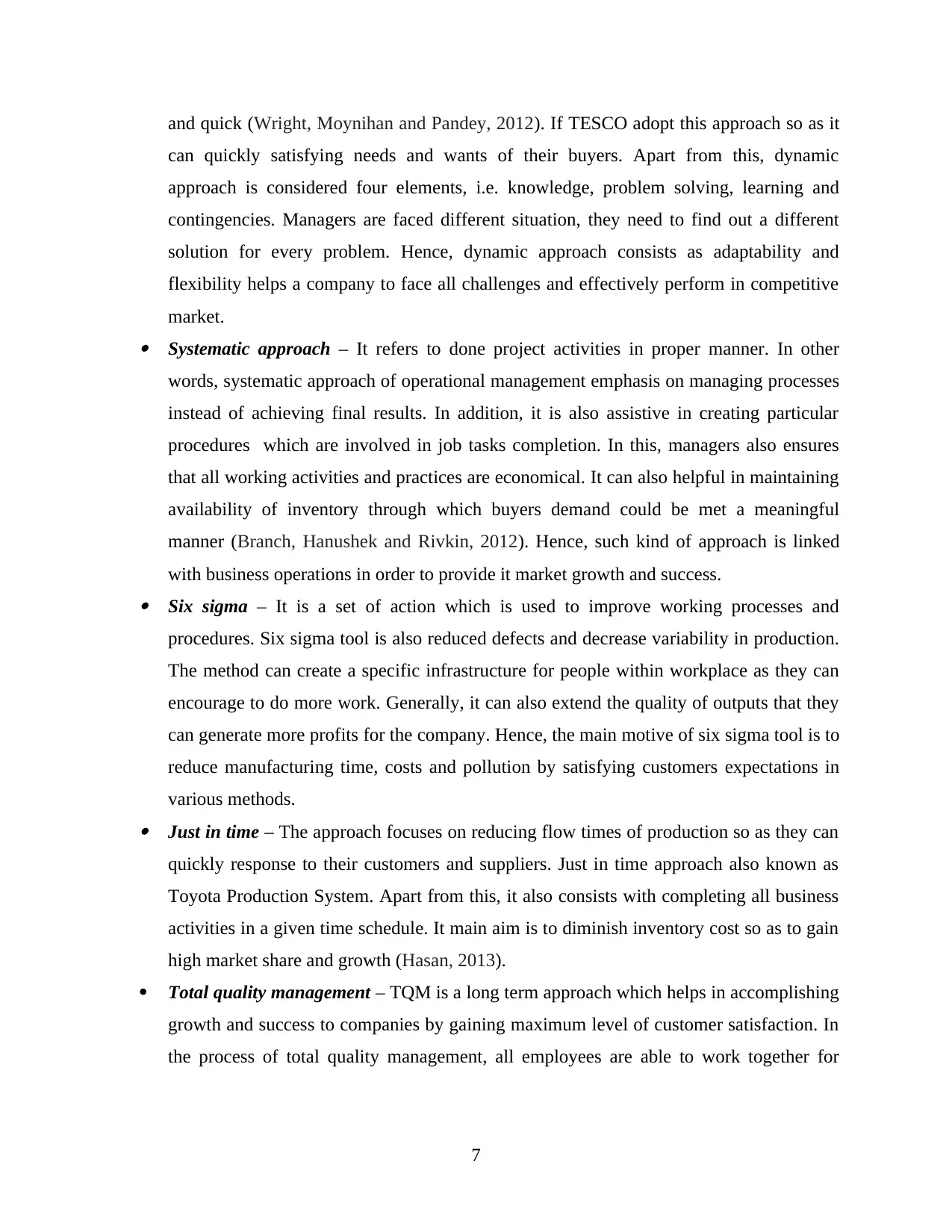
and quick (Wright, Moynihan and Pandey, 2012). If TESCO adopt this approach so as it
can quickly satisfying needs and wants of their buyers. Apart from this, dynamic
approach is considered four elements, i.e. knowledge, problem solving, learning and
contingencies. Managers are faced different situation, they need to find out a different
solution for every problem. Hence, dynamic approach consists as adaptability and
flexibility helps a company to face all challenges and effectively perform in competitive
market. Systematic approach – It refers to done project activities in proper manner. In other
words, systematic approach of operational management emphasis on managing processes
instead of achieving final results. In addition, it is also assistive in creating particular
procedures which are involved in job tasks completion. In this, managers also ensures
that all working activities and practices are economical. It can also helpful in maintaining
availability of inventory through which buyers demand could be met a meaningful
manner (Branch, Hanushek and Rivkin, 2012). Hence, such kind of approach is linked
with business operations in order to provide it market growth and success. Six sigma – It is a set of action which is used to improve working processes and
procedures. Six sigma tool is also reduced defects and decrease variability in production.
The method can create a specific infrastructure for people within workplace as they can
encourage to do more work. Generally, it can also extend the quality of outputs that they
can generate more profits for the company. Hence, the main motive of six sigma tool is to
reduce manufacturing time, costs and pollution by satisfying customers expectations in
various methods. Just in time – The approach focuses on reducing flow times of production so as they can
quickly response to their customers and suppliers. Just in time approach also known as
Toyota Production System. Apart from this, it also consists with completing all business
activities in a given time schedule. It main aim is to diminish inventory cost so as to gain
high market share and growth (Hasan, 2013).
Total quality management – TQM is a long term approach which helps in accomplishing
growth and success to companies by gaining maximum level of customer satisfaction. In
the process of total quality management, all employees are able to work together for
7
can quickly satisfying needs and wants of their buyers. Apart from this, dynamic
approach is considered four elements, i.e. knowledge, problem solving, learning and
contingencies. Managers are faced different situation, they need to find out a different
solution for every problem. Hence, dynamic approach consists as adaptability and
flexibility helps a company to face all challenges and effectively perform in competitive
market. Systematic approach – It refers to done project activities in proper manner. In other
words, systematic approach of operational management emphasis on managing processes
instead of achieving final results. In addition, it is also assistive in creating particular
procedures which are involved in job tasks completion. In this, managers also ensures
that all working activities and practices are economical. It can also helpful in maintaining
availability of inventory through which buyers demand could be met a meaningful
manner (Branch, Hanushek and Rivkin, 2012). Hence, such kind of approach is linked
with business operations in order to provide it market growth and success. Six sigma – It is a set of action which is used to improve working processes and
procedures. Six sigma tool is also reduced defects and decrease variability in production.
The method can create a specific infrastructure for people within workplace as they can
encourage to do more work. Generally, it can also extend the quality of outputs that they
can generate more profits for the company. Hence, the main motive of six sigma tool is to
reduce manufacturing time, costs and pollution by satisfying customers expectations in
various methods. Just in time – The approach focuses on reducing flow times of production so as they can
quickly response to their customers and suppliers. Just in time approach also known as
Toyota Production System. Apart from this, it also consists with completing all business
activities in a given time schedule. It main aim is to diminish inventory cost so as to gain
high market share and growth (Hasan, 2013).
Total quality management – TQM is a long term approach which helps in accomplishing
growth and success to companies by gaining maximum level of customer satisfaction. In
the process of total quality management, all employees are able to work together for
7
⊘ This is a preview!⊘
Do you want full access?
Subscribe today to unlock all pages.

Trusted by 1+ million students worldwide
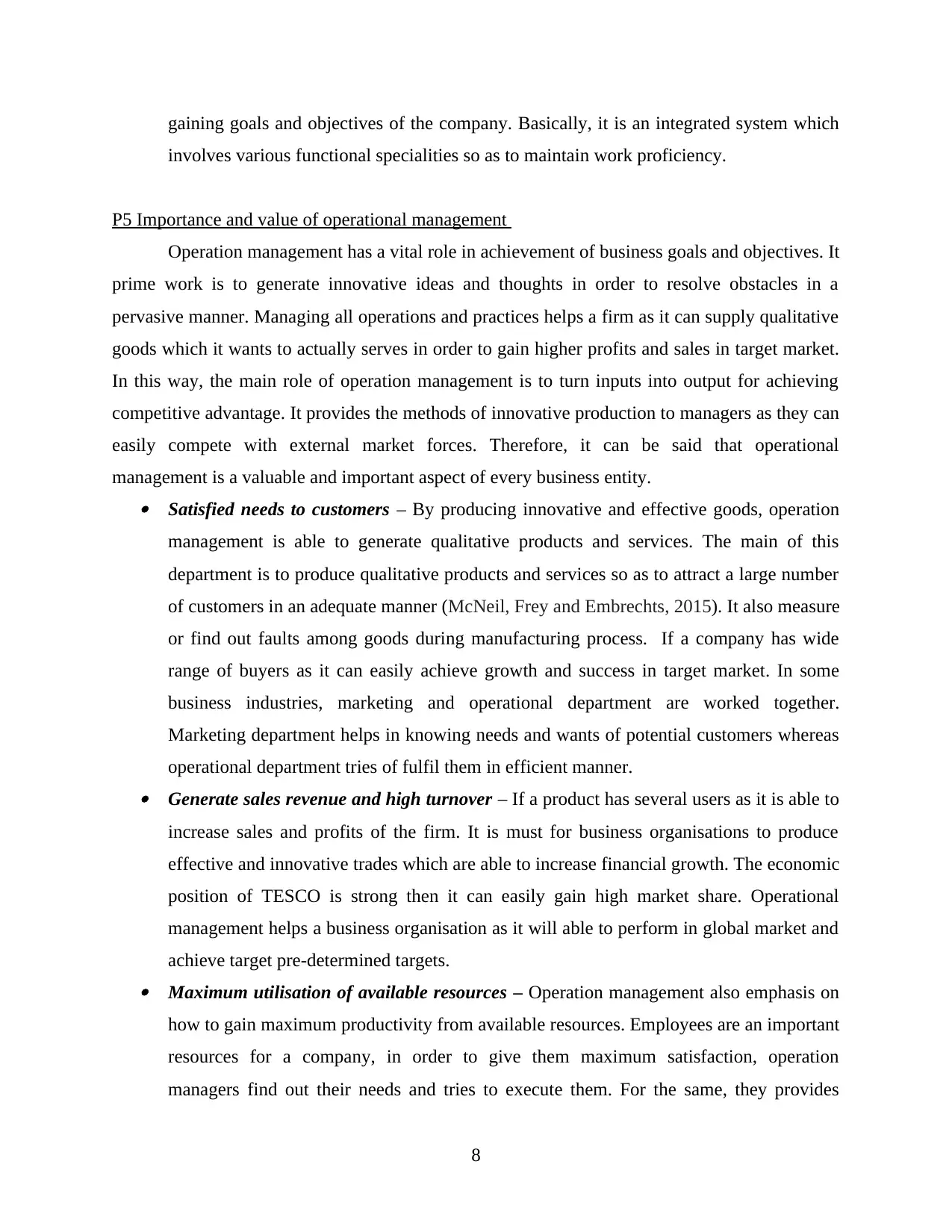
gaining goals and objectives of the company. Basically, it is an integrated system which
involves various functional specialities so as to maintain work proficiency.
P5 Importance and value of operational management
Operation management has a vital role in achievement of business goals and objectives. It
prime work is to generate innovative ideas and thoughts in order to resolve obstacles in a
pervasive manner. Managing all operations and practices helps a firm as it can supply qualitative
goods which it wants to actually serves in order to gain higher profits and sales in target market.
In this way, the main role of operation management is to turn inputs into output for achieving
competitive advantage. It provides the methods of innovative production to managers as they can
easily compete with external market forces. Therefore, it can be said that operational
management is a valuable and important aspect of every business entity. Satisfied needs to customers – By producing innovative and effective goods, operation
management is able to generate qualitative products and services. The main of this
department is to produce qualitative products and services so as to attract a large number
of customers in an adequate manner (McNeil, Frey and Embrechts, 2015). It also measure
or find out faults among goods during manufacturing process. If a company has wide
range of buyers as it can easily achieve growth and success in target market. In some
business industries, marketing and operational department are worked together.
Marketing department helps in knowing needs and wants of potential customers whereas
operational department tries of fulfil them in efficient manner. Generate sales revenue and high turnover – If a product has several users as it is able to
increase sales and profits of the firm. It is must for business organisations to produce
effective and innovative trades which are able to increase financial growth. The economic
position of TESCO is strong then it can easily gain high market share. Operational
management helps a business organisation as it will able to perform in global market and
achieve target pre-determined targets. Maximum utilisation of available resources – Operation management also emphasis on
how to gain maximum productivity from available resources. Employees are an important
resources for a company, in order to give them maximum satisfaction, operation
managers find out their needs and tries to execute them. For the same, they provides
8
involves various functional specialities so as to maintain work proficiency.
P5 Importance and value of operational management
Operation management has a vital role in achievement of business goals and objectives. It
prime work is to generate innovative ideas and thoughts in order to resolve obstacles in a
pervasive manner. Managing all operations and practices helps a firm as it can supply qualitative
goods which it wants to actually serves in order to gain higher profits and sales in target market.
In this way, the main role of operation management is to turn inputs into output for achieving
competitive advantage. It provides the methods of innovative production to managers as they can
easily compete with external market forces. Therefore, it can be said that operational
management is a valuable and important aspect of every business entity. Satisfied needs to customers – By producing innovative and effective goods, operation
management is able to generate qualitative products and services. The main of this
department is to produce qualitative products and services so as to attract a large number
of customers in an adequate manner (McNeil, Frey and Embrechts, 2015). It also measure
or find out faults among goods during manufacturing process. If a company has wide
range of buyers as it can easily achieve growth and success in target market. In some
business industries, marketing and operational department are worked together.
Marketing department helps in knowing needs and wants of potential customers whereas
operational department tries of fulfil them in efficient manner. Generate sales revenue and high turnover – If a product has several users as it is able to
increase sales and profits of the firm. It is must for business organisations to produce
effective and innovative trades which are able to increase financial growth. The economic
position of TESCO is strong then it can easily gain high market share. Operational
management helps a business organisation as it will able to perform in global market and
achieve target pre-determined targets. Maximum utilisation of available resources – Operation management also emphasis on
how to gain maximum productivity from available resources. Employees are an important
resources for a company, in order to give them maximum satisfaction, operation
managers find out their needs and tries to execute them. For the same, they provides
8
Paraphrase This Document
Need a fresh take? Get an instant paraphrase of this document with our AI Paraphraser
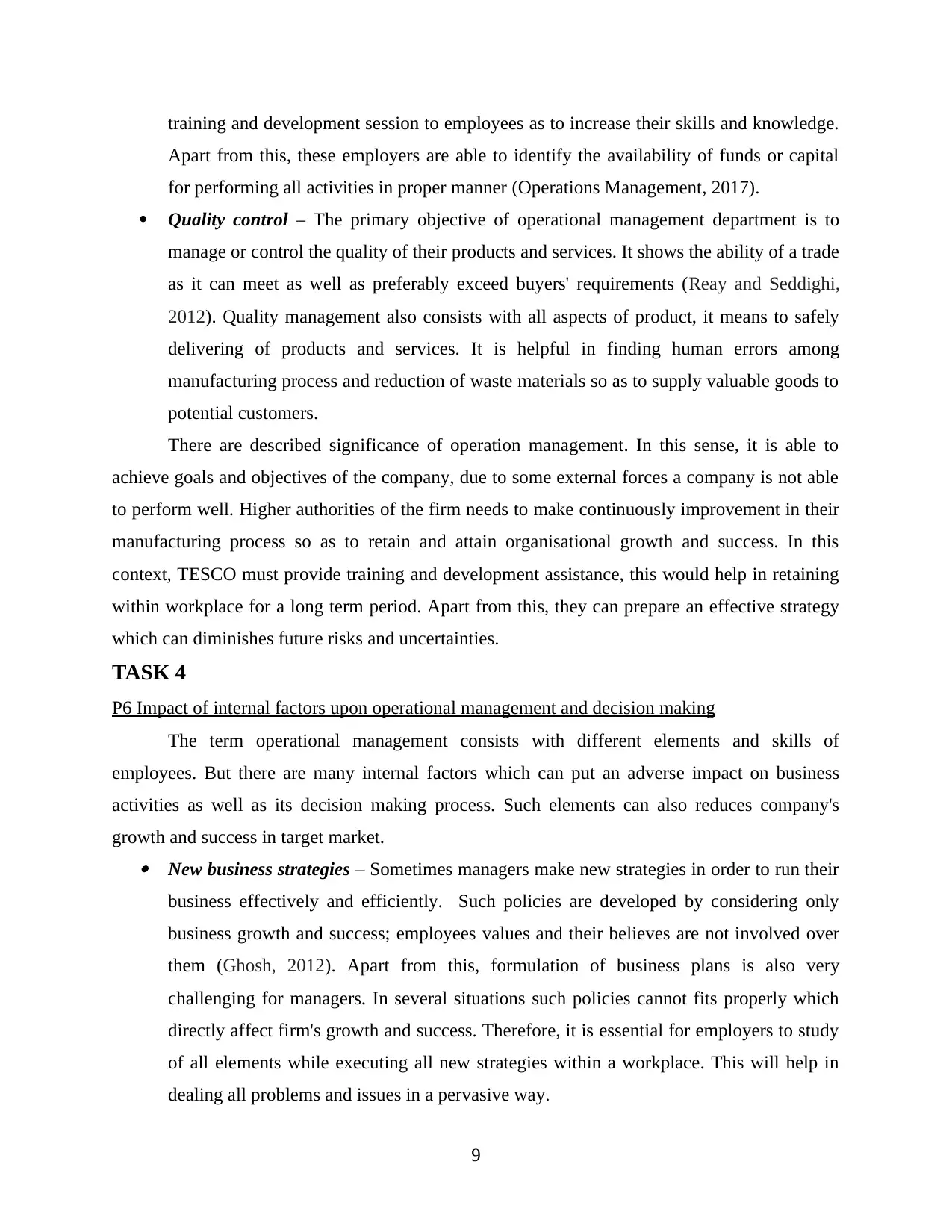
training and development session to employees as to increase their skills and knowledge.
Apart from this, these employers are able to identify the availability of funds or capital
for performing all activities in proper manner (Operations Management, 2017).
Quality control – The primary objective of operational management department is to
manage or control the quality of their products and services. It shows the ability of a trade
as it can meet as well as preferably exceed buyers' requirements (Reay and Seddighi,
2012). Quality management also consists with all aspects of product, it means to safely
delivering of products and services. It is helpful in finding human errors among
manufacturing process and reduction of waste materials so as to supply valuable goods to
potential customers.
There are described significance of operation management. In this sense, it is able to
achieve goals and objectives of the company, due to some external forces a company is not able
to perform well. Higher authorities of the firm needs to make continuously improvement in their
manufacturing process so as to retain and attain organisational growth and success. In this
context, TESCO must provide training and development assistance, this would help in retaining
within workplace for a long term period. Apart from this, they can prepare an effective strategy
which can diminishes future risks and uncertainties.
TASK 4
P6 Impact of internal factors upon operational management and decision making
The term operational management consists with different elements and skills of
employees. But there are many internal factors which can put an adverse impact on business
activities as well as its decision making process. Such elements can also reduces company's
growth and success in target market. New business strategies – Sometimes managers make new strategies in order to run their
business effectively and efficiently. Such policies are developed by considering only
business growth and success; employees values and their believes are not involved over
them (Ghosh, 2012). Apart from this, formulation of business plans is also very
challenging for managers. In several situations such policies cannot fits properly which
directly affect firm's growth and success. Therefore, it is essential for employers to study
of all elements while executing all new strategies within a workplace. This will help in
dealing all problems and issues in a pervasive way.
9
Apart from this, these employers are able to identify the availability of funds or capital
for performing all activities in proper manner (Operations Management, 2017).
Quality control – The primary objective of operational management department is to
manage or control the quality of their products and services. It shows the ability of a trade
as it can meet as well as preferably exceed buyers' requirements (Reay and Seddighi,
2012). Quality management also consists with all aspects of product, it means to safely
delivering of products and services. It is helpful in finding human errors among
manufacturing process and reduction of waste materials so as to supply valuable goods to
potential customers.
There are described significance of operation management. In this sense, it is able to
achieve goals and objectives of the company, due to some external forces a company is not able
to perform well. Higher authorities of the firm needs to make continuously improvement in their
manufacturing process so as to retain and attain organisational growth and success. In this
context, TESCO must provide training and development assistance, this would help in retaining
within workplace for a long term period. Apart from this, they can prepare an effective strategy
which can diminishes future risks and uncertainties.
TASK 4
P6 Impact of internal factors upon operational management and decision making
The term operational management consists with different elements and skills of
employees. But there are many internal factors which can put an adverse impact on business
activities as well as its decision making process. Such elements can also reduces company's
growth and success in target market. New business strategies – Sometimes managers make new strategies in order to run their
business effectively and efficiently. Such policies are developed by considering only
business growth and success; employees values and their believes are not involved over
them (Ghosh, 2012). Apart from this, formulation of business plans is also very
challenging for managers. In several situations such policies cannot fits properly which
directly affect firm's growth and success. Therefore, it is essential for employers to study
of all elements while executing all new strategies within a workplace. This will help in
dealing all problems and issues in a pervasive way.
9
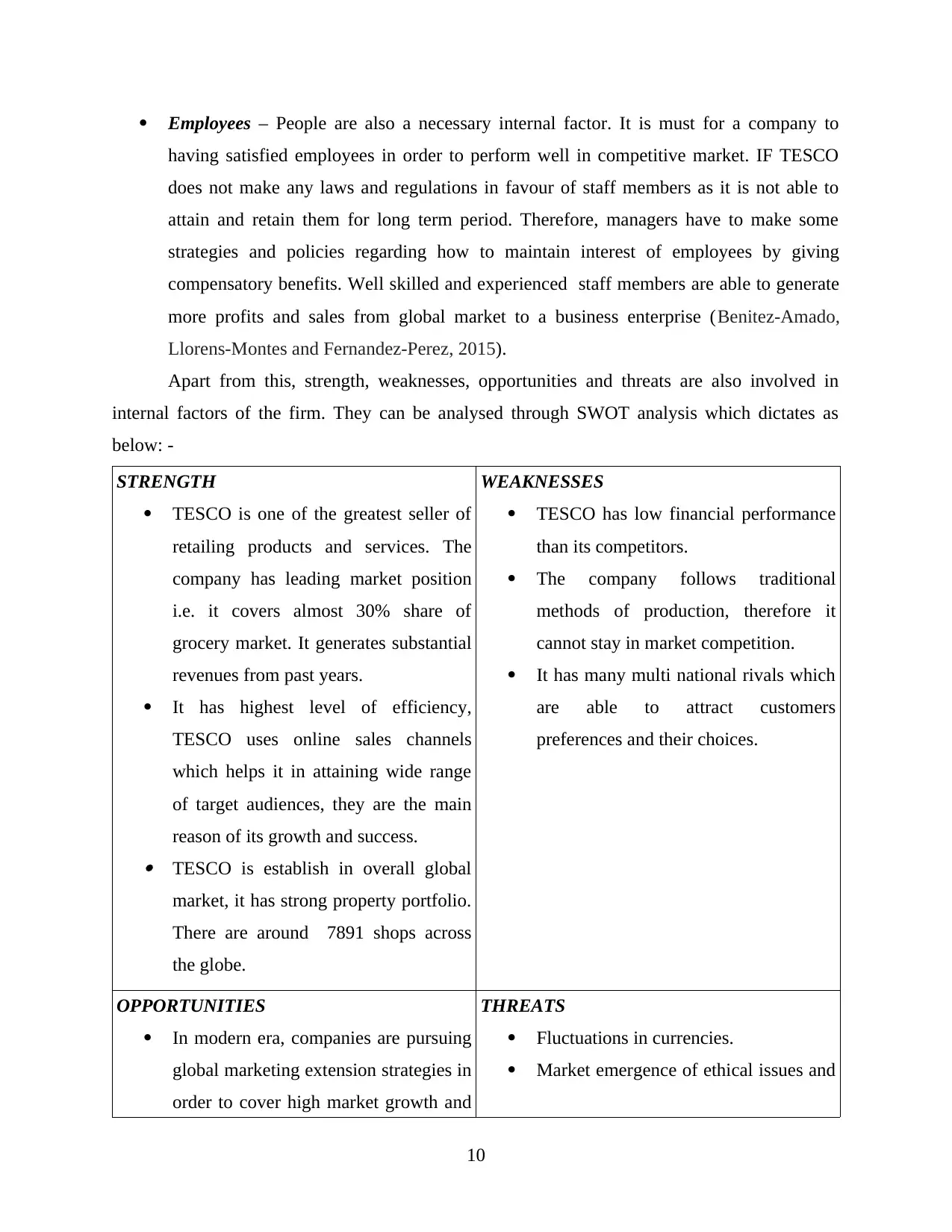
Employees – People are also a necessary internal factor. It is must for a company to
having satisfied employees in order to perform well in competitive market. IF TESCO
does not make any laws and regulations in favour of staff members as it is not able to
attain and retain them for long term period. Therefore, managers have to make some
strategies and policies regarding how to maintain interest of employees by giving
compensatory benefits. Well skilled and experienced staff members are able to generate
more profits and sales from global market to a business enterprise (Benitez-Amado,
Llorens-Montes and Fernandez-Perez, 2015).
Apart from this, strength, weaknesses, opportunities and threats are also involved in
internal factors of the firm. They can be analysed through SWOT analysis which dictates as
below: -
STRENGTH
TESCO is one of the greatest seller of
retailing products and services. The
company has leading market position
i.e. it covers almost 30% share of
grocery market. It generates substantial
revenues from past years.
It has highest level of efficiency,
TESCO uses online sales channels
which helps it in attaining wide range
of target audiences, they are the main
reason of its growth and success. TESCO is establish in overall global
market, it has strong property portfolio.
There are around 7891 shops across
the globe.
WEAKNESSES
TESCO has low financial performance
than its competitors.
The company follows traditional
methods of production, therefore it
cannot stay in market competition.
It has many multi national rivals which
are able to attract customers
preferences and their choices.
OPPORTUNITIES
In modern era, companies are pursuing
global marketing extension strategies in
order to cover high market growth and
THREATS
Fluctuations in currencies.
Market emergence of ethical issues and
10
having satisfied employees in order to perform well in competitive market. IF TESCO
does not make any laws and regulations in favour of staff members as it is not able to
attain and retain them for long term period. Therefore, managers have to make some
strategies and policies regarding how to maintain interest of employees by giving
compensatory benefits. Well skilled and experienced staff members are able to generate
more profits and sales from global market to a business enterprise (Benitez-Amado,
Llorens-Montes and Fernandez-Perez, 2015).
Apart from this, strength, weaknesses, opportunities and threats are also involved in
internal factors of the firm. They can be analysed through SWOT analysis which dictates as
below: -
STRENGTH
TESCO is one of the greatest seller of
retailing products and services. The
company has leading market position
i.e. it covers almost 30% share of
grocery market. It generates substantial
revenues from past years.
It has highest level of efficiency,
TESCO uses online sales channels
which helps it in attaining wide range
of target audiences, they are the main
reason of its growth and success. TESCO is establish in overall global
market, it has strong property portfolio.
There are around 7891 shops across
the globe.
WEAKNESSES
TESCO has low financial performance
than its competitors.
The company follows traditional
methods of production, therefore it
cannot stay in market competition.
It has many multi national rivals which
are able to attract customers
preferences and their choices.
OPPORTUNITIES
In modern era, companies are pursuing
global marketing extension strategies in
order to cover high market growth and
THREATS
Fluctuations in currencies.
Market emergence of ethical issues and
10
⊘ This is a preview!⊘
Do you want full access?
Subscribe today to unlock all pages.

Trusted by 1+ million students worldwide
1 out of 15
Related Documents
Your All-in-One AI-Powered Toolkit for Academic Success.
+13062052269
info@desklib.com
Available 24*7 on WhatsApp / Email
![[object Object]](/_next/static/media/star-bottom.7253800d.svg)
Unlock your academic potential
Copyright © 2020–2026 A2Z Services. All Rights Reserved. Developed and managed by ZUCOL.





